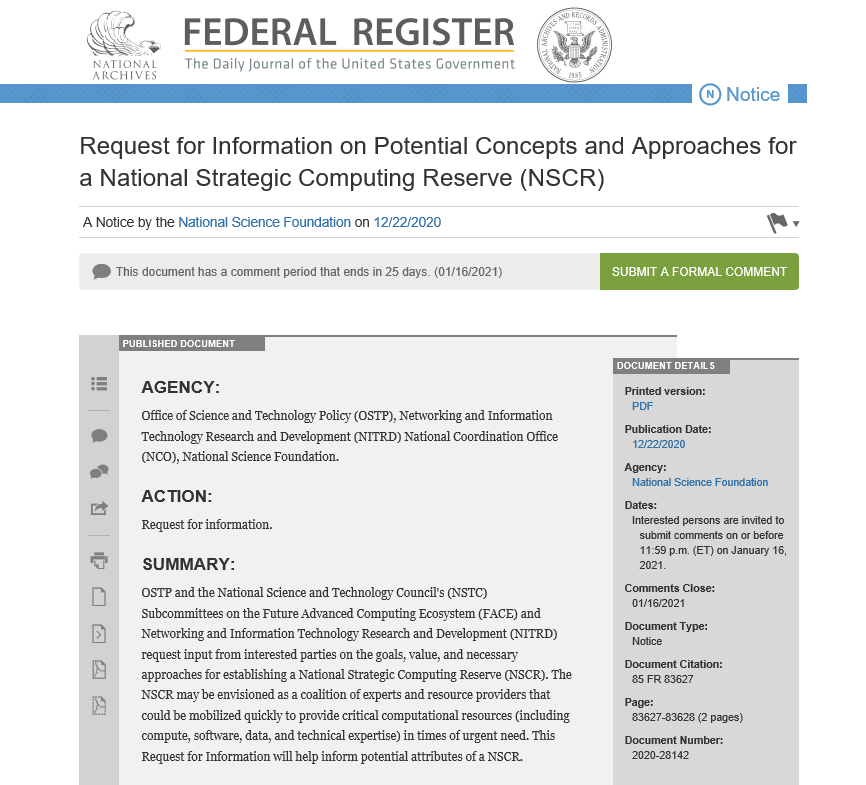Federal Register Notice: 85 FR 83627
ACTION:
Request for information.
SUMMARY:
OSTP and the National Science and Technology Council’s (NSTC) Subcommittees on the Future Advanced Computing Ecosystem (FACE) and Networking and Information Technology Research and Development (NITRD) request input from interested parties on the goals, value, and necessary approaches for establishing a National Strategic Computing Reserve (NSCR). The NSCR may be envisioned as a coalition of experts and resource providers that could be mobilized quickly to provide critical computational resources (including compute, software, data, and technical expertise) in times of urgent need. This Request for Information will help inform potential attributes of a NSCR.
DATES:
Interested persons are invited to submit comments on or before 11:59 p.m. (ET) on January 16, 2021.
ADDRESSES:
Comments submitted in response to this notice may be sent by any of the following methods:
- Email: nscr-rfi@nitrd.gov. Email submissions should be machine-readable and not be copy-protected. Submissions should include “RFI Response: National Strategic Computing Reserve” in the subject line of the message. Start Printed Page 83628
- Fax: (202) 459-9673, Attn: Ji Lee.
- Mail: Attn: Ji Lee, NCO, 2415 Eisenhower Avenue, Alexandria, VA 22314, USA.
Instructions: Response to this RFI is voluntary. Each individual or institution is requested to submit only one response. Submissions must not exceed 10 pages in 12 point or larger font, with a page number provided on each page. Responses should include the name of the person(s) or organization(s) filing the comment. Responses to this RFI may be posted online at https://www.nitrd.gov. Therefore, no business proprietary information, copyrighted information, or personally identifiable information should be submitted in response to this RFI.
In accordance with FAR 15.202(3), responses to this notice are not offers and cannot be accepted by the Government to form a binding contract. Responders are solely responsible for all expenses associated with responding to this RFI.
FOR FURTHER INFORMATION CONTACT:
Ji Lee at nscr-rfi@nitrd.gov, 202-459-9674, or by post mailing to 2415 Eisenhower Avenue, Alexandria, VA 22314, USA. Individuals who use a telecommunications device for the deaf (TDD) may call the Federal Information Relay Service (FIRS) at 1-800-877-8339 between 8 a.m. and 8 p.m., Eastern time, Monday through Friday.
SUPPLEMENTARY INFORMATION:
The prompt, successful, and nimble deployment of computational resources (including expertise) via the COVID-19 High-Performance Computing (HPC) Consortium has demonstrated its essential role in the Nation’s response to emergencies. This backdrop has led to the conceptualization of a National Strategic Computing Reserve (NSCR), comprising a coalition of experts and resource providers that could be mobilized quickly to provide critical computational resources (including compute, software, data, and technical expertise) in times of urgent need.
Background Information: The COVID-19 HPC Consortium (https://covid19-hpc-consortium.org/) was formed in March 2020 and offers an example of how the consortium rapidly delivered scientific insights. The Consortium brought together the Federal Government, industry, and academic leaders to provide access to the world’s most powerful computational resources in support of COVID-19 research. Within its first week of existence, the Consortium instantiated an operational framework for providing computational resources for rapid crisis response. The Consortium effectively:
- Worked together across institutional and organizational boundaries within government, industry, and academia to create a common portal to access computational resources and to coalesce ad hoc efforts in smaller “consortia” around the country;
- Ramped up quickly to meet urgent computational resource requirements not easily available through other means; this ramp-up included the development and adaptation of review, matching and on-boarding processes for accessing these resources;
- Set up a communications and user engagement framework for a worldwide community; and
- Accelerated explorations in basic understanding of the SARS-CoV2 virus, its host interactions, strategies to mitigate its spread, and early-stage drug development.
With this RFI, we seek to aggregate the lessons learned from the COVID-19 HPC Consortium with other broader community input towards the potential design of a NSCR effort.
Information Requested: Responders are asked to answer one or more of the following questions in the responses to the RFI:
1. Deployment Scenarios: What are envisioned scenarios under which it would be beneficial to make NSCR computational resources available for use? What are relevant characteristics to consider regarding the design of triggers for activating and deactivating the NSCR? What approaches might the NSCR utilize to test readiness for such scenarios? Are there other barriers to activating NSCR that would need to be addressed?
2. Computational Resources: By what means will the NSCR computational resources be recruited, vetted, and sustained for use when needed? What are appropriate incentives and mechanisms for compensation? What principles might be employed in assessing the suitability of resources for inclusion in the NSCR? What types of research (e.g., fundamental research, Controlled Unclassified Information research, proprietary research) should the NSCR be provisioned to support?
3. NSCR Providers: How should the resource providers’ contributions to NSCR be determined? What approaches should guide the selection and allocation of the NSCR computational resources to users, and what roles do resource providers have in determining these approaches? By what means can the NSCR computational resource providers opt in or opt out on computational resource allocations?
4. NSCR Users: By what means and with what principles should allocations for NSCR computational resources be considered? What should constitute eligibility to apply for computational resources? What kind of eligibility restrictions/selection criteria would be appropriate for users and the use cases of applications of NSCR?
5. Community Formation: What types of community outreach and communications will help enhance the likelihood of connecting the NSCR computational resources to the relevant computational, scientific, and emergency-response communities? With what organizations and services should the NSCR coordinate to enhance its effectiveness?
6. Partnership Agreements: What are key aspects of partnership agreements (e.g., access to results, intellectual property rights) that can help sustain the NSCR over time?
7. Relationship to Other Strategic Reserves: Are there other strategic reserves that are relevant to NSCR? How can NSCR connect or interface with those reserves? What lessons can be learned from other strategic reserves that might inform the process of standing up a NSCR?
Submitted by the National Science Foundation in support of the Office of Science and Technology Policy and the Networking and Information Technology Research and Development National Coordination Office on December 16, 2020.
(Authority: 42 U.S.C. 1861.)
Suzanne H. Plimpton,
Reports Clearance Officer, National Science Foundation.
[FR Doc. 2020-28142 Filed 12-21-20; 8:45 am]
BILLING CODE 7555-01-P


